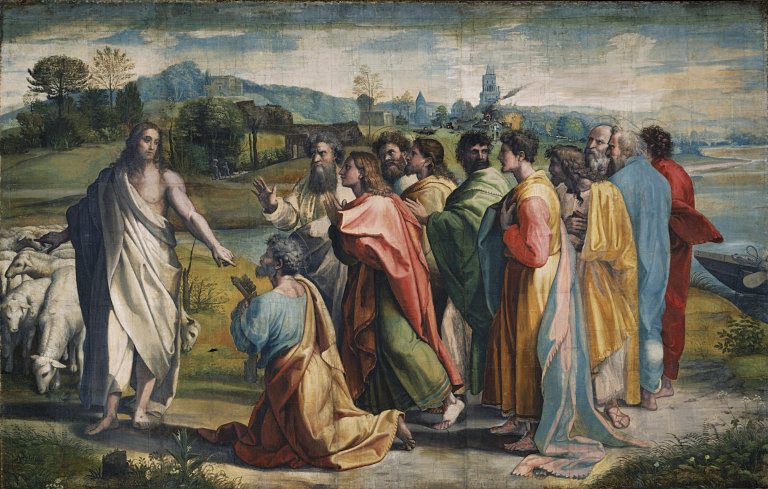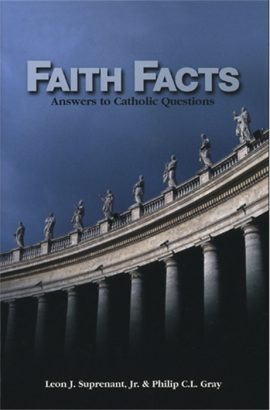By Leon J. Suprenant Jr. and Philip C.L. Gray
Together, Leon Supernant and Philip Gray are the authors of Faith Facts, a series of two books answering common questions on the Catholic faith.

Papal authority has divine origin. The Lord made Simon alone, whom He named Peter, the “rock” of His Church. He gave him the keys of His Church and instituted him shepherd of the whole flock.
As Isaiah 43:1 points out, the act of naming claims the one named. This “claiming” includes the recognition of a particular purpose or mission. Scripture makes this evident in the passages about God’s naming of Abraham and Israel (Gen 17:5, 32:29). When Nebuchadnezzar appointed Mattaniah as king of Judah, he changed Mattaniah’s name to Zedekiah as a sign that the new king’s authority came from the king of Babylon (2 Kings 24:17). In this same way, Jesus claims Peter and his successors to be the visible source of authority in His Church. In Matthew 16:18, Our Lord said to Simon: “And I tell you, you are Peter, and on this rock I will build my church.”
Until Jesus named Peter, Scripture only referred to God as “rock,” in the sense of an unfailing bulwark against the powers of evil. By making Peter the “rock” of His Church, Christ grants him divine authority over the Church on earth as His universal Vicar. He gives Peter divine power to fulfill his mission. The name “Rock” identifies Peter’s mission with the authority of Christ. The primary function of this authority is unity (Luke 22:31-32).
Because of Baptism, the Catholic faithful have a divine obligation to maintain unity with the Catholic Church. Profession of faith, ecclesiastical governance, and the sacraments constitute the visible bonds of unity between the Catholic faithful and the Church of Christ ruled by the Pope and bishops in union with him. As Christ conveyed to Peter and the first apostles, if any of these bonds of unity are lacking, unity with the Church is lacking: “He who hears you hears me, and he who rejects you rejects me, and he who rejects me rejects him who sent me” (Luke 10:16).
To understand papal authority, we must understand the authoritative nature of the deposit of faith. Jesus Christ is the fullness of all Revelation. He is the Second Person of the Blessed Trinity, the Word made flesh. Through Him, all have access to the Father through the Holy Spirit. Through His words and deeds, especially His death and Resurrection, He has entrusted the sum total of all truth to His bride, the Church. The fullness of Christ’s Revelation is the one deposit of faith. Because it is given by Christ, the deposit of faith is inerrant, unchangeable, and has application in every culture for all ages. Being the source of all divinely revealed truth, the one deposit of faith is the wellspring from which all doctrines and definitions of the faith flow.
To ensure unity of faith, the Magisterium of the Church has the task of interpreting the deposit of faith and applying it to specific times and circumstances. The Magisterium of the Church sometimes offers a solemn definition on a matter pertaining to faith or morals. These definitions provide absolute certainty that the teaching belongs to the deposit of faith. In other instances, the Magisterium identifies the truth found in the deposit of faith without providing a solemn definition. In these instances, though not solemnly defined, the teaching cannot be changed because it is true. These teachings are infallible.
If the Pope appeals to the deposit of faith, whether by pronouncement of the solemn or ordinary Magisterium, the teaching must be believed with divine and catholic faith. These magisterial teachings demand full assent of divine and catholic faith.
When, in exercise of the solemn Magisterium, the Pope speaks ex cathedra, the faithful are bound to accept the teaching with divine and catholic faith and must avoid any doctrines that are contrary to these truths. The exercise of the solemn Magisterium by the Pope occurs when he proclaims with a definitive act that a doctrine of faith or morals is infallible teaching. This infallibility derives from the authority Christ entrusted to His Church, and extends as far as the deposit of faith itself, as well as to doctrinal elements needed to preserve, expound, or observe this deposit and the precepts of the natural law (cf. 1 Tim 6:20; Catechism 2035-36, 2051).
Infallible character is not given to a document as a whole, but only to that portion which explicitly defines a doctrine of faith or morals. The wording of such definitions must reflect the intention to define infallibly. It must be precise and clear.
More frequently, the Pope appeals to the deposit of faith by use of the ordinary Magisterium. This occurs when he definitively confirms a teaching as pertaining to the deposit of faith. Examples of such teachings include: male-only priesthood (Pope John Paul II’s apostolic letter, Ordinatio Sacerdotalis), the intrinsic evils of abortion and euthanasia (Pope John Paul II’s encyclical letter, Evangelium Vitae), and the intrinsic evil of contraception (Pope Paul VI’s encyclical letter, Humanae Vitae).
While these documents do not contain explicit definitions as noted above, their wording clearly appeals to the authority of the Pope to confirm what proceeds from the deposit of faith. As such, these teachings enjoy infallibility and demand the assent of divine and catholic faith.
Because these teachings have not been proposed or confirmed through a solemn definition, many mistakenly believe that such teachings can be revised. However, the Pope exercises the authentic Magisterium whenever he teaches on faith and morals. Whether the document contains infallible statements or not, the document as a whole carries this authority.
The Pope commonly uses encyclicals to communicate such pronouncements. Humanae Vitae, for example, contains teachings of the ordinary Magisterium that require the assent of divine and catholic faith.
Canon 754 identifies another level of obedience pertaining to constitutions and decrees issued to establish discipline and answer erroneous opinions. While not demanding a full assent of faith, these documents call for an assent of will that flows from faith, and the faithful are obliged to observe them.
Other than God Himself, there is no authority above the Pope. Obedience to him must flow, not so much from an understanding of faith, but from faith itself, which guides and nourishes the will. Thus, whether dealing with infallible doctrine or a decree that concerns a Church discipline, obedience to the Pope exemplifies a unity of faith founded on the will of Christ.
You Might Also Like

Faith Facts: Answers to Catholic Questions, Volume I presents sound, constructive teaching on a variety of subjects important to Catholics today. This volume answers more than twenty questions related to key Catholic teachings such as the Real Presence in the Eucharist, papal authority, and more.